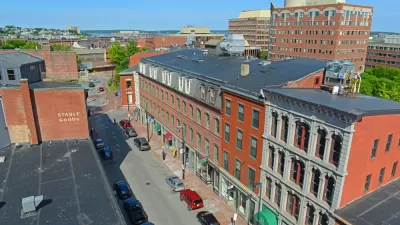By a vote split (nearly) down the party line, the Oregon House passed a bill to end state restrictions on inclusionary zoning. Municipalities may soon be able to require below-market pricing.

In a victory for affordable housing in Oregon, the state House of Representatives passed a bill to allow a certain degree of inclusionary zoning. These rules would require "developers in certain areas to offer some housing units at below-market prices, usually to people with middle or low incomes."
To placate legislators concerned about backlash from the development industry, "the bill likely to pass the House today will do so thanks to an amendment brokered by [House Speaker] Kotek that would set a maximum of 30 percent below-market units per project, or the equivalent."
Equity advocates "say it's a needed tool for preserving income diversity in high-demand neighborhoods like central Portland. Opponents, led by the state's homebuilders' association, say private developers shouldn't bear the costs of keeping neighborhoods income-diverse."
Predictions that the decision would be split along party lines were just about valid: "The bill did indeed pass the house, 34-25, on a nearly party-line vote. Brian Clem (D-Salem) voted against the bill."
FULL STORY: Oregon House likely to pass bill to preserve income-diverse neighborhoods

Maui's Vacation Rental Debate Turns Ugly
Verbal attacks, misinformation campaigns and fistfights plague a high-stakes debate to convert thousands of vacation rentals into long-term housing.

Planetizen Federal Action Tracker
A weekly monitor of how Trump’s orders and actions are impacting planners and planning in America.

In Urban Planning, AI Prompting Could be the New Design Thinking
Creativity has long been key to great urban design. What if we see AI as our new creative partner?

King County Supportive Housing Program Offers Hope for Unhoused Residents
The county is taking a ‘Housing First’ approach that prioritizes getting people into housing, then offering wraparound supportive services.

Researchers Use AI to Get Clearer Picture of US Housing
Analysts are using artificial intelligence to supercharge their research by allowing them to comb through data faster. Though these AI tools can be error prone, they save time and housing researchers are optimistic about the future.

Making Shared Micromobility More Inclusive
Cities and shared mobility system operators can do more to include people with disabilities in planning and operations, per a new report.
Urban Design for Planners 1: Software Tools
This six-course series explores essential urban design concepts using open source software and equips planners with the tools they need to participate fully in the urban design process.
Planning for Universal Design
Learn the tools for implementing Universal Design in planning regulations.
planning NEXT
Appalachian Highlands Housing Partners
Mpact (founded as Rail~Volution)
City of Camden Redevelopment Agency
City of Astoria
City of Portland
City of Laramie





























